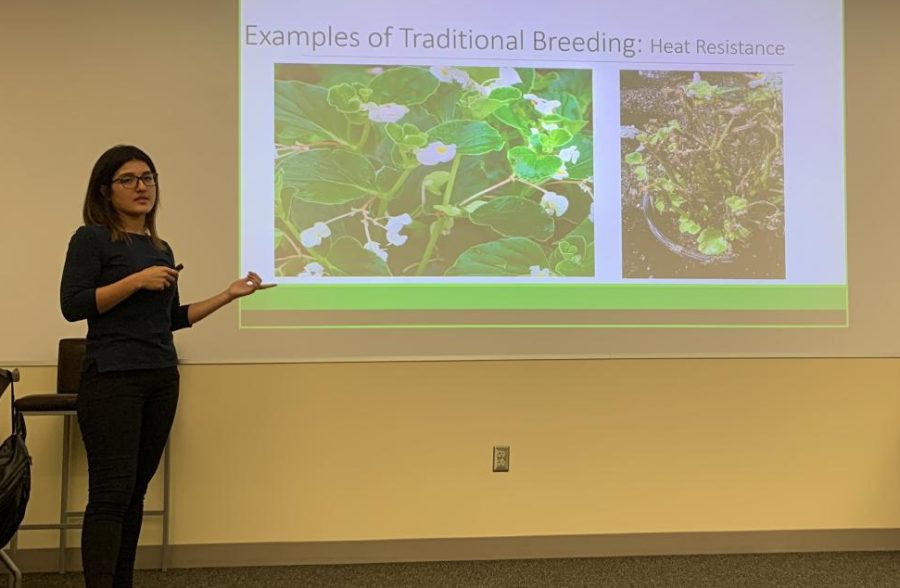Emily Rodriguez Shares Work on Modern Plant Breeding For BioTech Connect in February
Emily Rodriguez presented this month’s Biotech Connect on February 22 at Valencia College’s Lake Nona Campus.
February 26, 2023

Researcher Emily Rodriguez presented this month’s Biotech Connect on February 22 at Valencia College’s Lake Nona Campus.
UCF Biotechnologist and UF/IFAS MREC (Apopka) Research Assistant Emily Rodriguez discussed with Valencia students and attendees about “Modern Plant Bleeding: Opportunities and Challenges”.
Biotech Connect is a great opportunity for influential people in the biotechnology field to present their research to students who study it. This series of presentations encourage others to study the career based on one of the many branches of science, promoting education and opening up many opportunities for future bioscience graduates.
During the presentation, Rodriguez shared different topics such as plant domestication based on goals that have to be improved such as taste, nutrition, yield, appearance, and storage. Rodriguez showed how different the planted fruits and vegetables look instead of when they appear in the supermarket. Traditional breeding, which is one of the oldest methods of breeding, is used to modify plants to create a hybrid. It is important to note that the results are not obtained in the first trial, but it is possible to spend many years looking for a resistant hybrid plant.
Rodriguez shared how genetic engineering is a technique that is used by placing a foreign gene within a DNA strand. However, genome editing does not have a foreign gene and could change the organ size, the leaf senescence, and a clear example of why these experiments are carried out is due to creating a possibility that vegetables can stay longer in supermarkets without getting damaged.
Valencia College’s Lake Nona Biotechnology Professor Susan Ingersoll says, “It was a really nice perspective. I think overall it opened people’s eyes to the world of plant breeding and plant genetics and how we took what started as corn to what it is now.” Ingersoll mentioned how cool seeing the petunias with leaves were in senescence, how the ones that had better leaves had less flowers then the ones without. “I was like, that does kind of make sense because the plant only has so much energy it can expend. So if it is spending all its energy into leaves to make them not die, then it is not going to be able to put as much into flowers and vice versa. If the leaves are dying, then it can put more energy into flowers.” This petunia experiment from which host Emily Rodriguez shared provides interesting differences.
Rodriguez also shared the qualities that make her continue on the path to the proposed goals, “I am very self-driven. I am very focused, and I am a very hardworking person. I do not take no for an answer very easily and am very passionate about what I do.” She continued explaining how she manages the times to get results on experiments. “I manage staying focused and just being persistent about what I am doing, just realizing that not everything is perfect, and not everything is going to come out 100% perfect either.” Expressing that there are times when there will be mistakes but the important thing is not to give up and continue working on the project until the results are obtained.
Valencia College student Destiny Reynoso, 19, Biotechnology Lab, shared, “I really liked what she said in the beginning, that she did not know what she wanted, but when she went there (UF/ IFAS), it was the right fit for her. So, it was reassuring to hear that. Even if you are kind of confused, you do not have to know now, you can find out later down the road.”
Thais Ortiz, 21, Biomedical Science, commented, “(Rodriguez) really inspired me to get more into biotechnology. I was considering getting a Masters in Biotechnology, and since sharing her experience with the lab and working with genetical engineering, it gives me more motivation to get into that path.” Biotech Connect presentations have made several students feel inspired and encouraged to study this career path.
Biotech Connect is a great opportunity to publicize the different activities that are carried out in this field. Every month, Biotech Connect hosts panels at the Lake Nona Campus where people can show their experimental work to students interested in Biotechnology to inspire and inform them about how things are done in this field of science.



